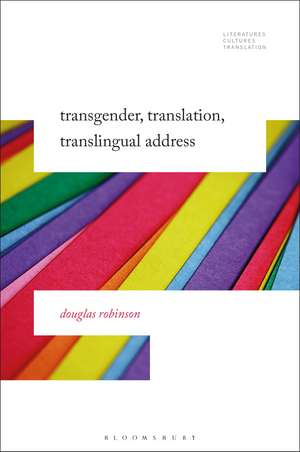Transgender, Translation, Translingual Address: Literatures, Cultures, Translation
Autor Professor Douglas Robinsonen Limba Engleză Paperback – 22 iul 2020
| Toate formatele și edițiile | Preț | Express |
|---|---|---|
| Paperback (1) | 223.93 lei 6-8 săpt. | |
| Bloomsbury Publishing – 22 iul 2020 | 223.93 lei 6-8 săpt. | |
| Hardback (1) | 714.12 lei 6-8 săpt. | |
| Bloomsbury Publishing – 23 ian 2019 | 714.12 lei 6-8 săpt. |
Preț: 223.93 lei
Preț vechi: 288.46 lei
-22% Nou
Puncte Express: 336
Preț estimativ în valută:
42.85€ • 44.85$ • 35.66£
42.85€ • 44.85$ • 35.66£
Carte tipărită la comandă
Livrare economică 31 martie-14 aprilie
Preluare comenzi: 021 569.72.76
Specificații
ISBN-13: 9781501366666
ISBN-10: 1501366661
Pagini: 288
Dimensiuni: 140 x 216 mm
Greutate: 0.33 kg
Editura: Bloomsbury Publishing
Colecția Bloomsbury Academic
Seria Literatures, Cultures, Translation
Locul publicării:New York, United States
ISBN-10: 1501366661
Pagini: 288
Dimensiuni: 140 x 216 mm
Greutate: 0.33 kg
Editura: Bloomsbury Publishing
Colecția Bloomsbury Academic
Seria Literatures, Cultures, Translation
Locul publicării:New York, United States
Caracteristici
Offers a mediatory ("translational," "translingual") perspective that stages open-ended cis-trans dialogues rather than imposing definitional closure
Notă biografică
Douglas Robinson is one of the world's leading translation scholars, and cis-gendered in a male body. Author or editor of two dozen books and five dozen articles on translation, literature, linguistics, rhetoric, writing, and gender, he is Chair Professor of English at Hong Kong Baptist University, Hong Kong.
Cuprins
List of FiguresPermissionsPreface AcknowledgementsChapter 1. Why Should Cisnormative Translation Scholars Care About Translation and Transgender?Chapter 2. The Semiosphere Must Be Fed by at Least Two LanguagesChapter 3. New Worlds (the Emergence of the Unexpected): The Ecology of Gender as a Dissipative System Chapter 4. Becoming-Trans: The Rhizomatics of GenderConcludingly: (Peri)Performative Becoming-QueerNotesWorks Cited Index
Recenzii
Douglas Robinson deftly maps the tangled switch-points to be found at the intersection of translation and transgender, foregrounding attention to how transgender concepts, texts, and voices are translated from one language to another, in order to broach fundamental questions regarding how meaning must be carried across difference by any intention to communicate. It offers a smart take on issues of translation and language in transgender studies and its foundational critical texts, as well as a useful introduction to transgender studies for translation studies scholars.
When a veteran of literary translation and Translation Studies turns his attentions to a new realm of radical, cutting-edge scholarship like Transgender Studies, one should expect the results will be audacious, searching, and richly informed. In his book, Robinson stages iconoclastic conceptual confrontations between transgender positionality and translation practice, which are flush with erudition and inquisitiveness. The writing is at turns wildly deconstructive, kinetically interactive, and provocatively humanistic, such that reading each new page's soaring lines of figuration requires heightened engagement, even readerly poise. Emerging and founding voices in both Transgender Studies and Translation Studies are brought into energetic conversation with one another-in ways they themselves would likely have least predicted. Daring readers will finish the book outfitted with new concepts, new clarity, and new questions, earned through their sojourn through Robinson's unique experimentalism.
An absolutely fascinating meditation on a topic critical to modern thought.
When a veteran of literary translation and Translation Studies turns his attentions to a new realm of radical, cutting-edge scholarship like Transgender Studies, one should expect the results will be audacious, searching, and richly informed. In his book, Robinson stages iconoclastic conceptual confrontations between transgender positionality and translation practice, which are flush with erudition and inquisitiveness. The writing is at turns wildly deconstructive, kinetically interactive, and provocatively humanistic, such that reading each new page's soaring lines of figuration requires heightened engagement, even readerly poise. Emerging and founding voices in both Transgender Studies and Translation Studies are brought into energetic conversation with one another-in ways they themselves would likely have least predicted. Daring readers will finish the book outfitted with new concepts, new clarity, and new questions, earned through their sojourn through Robinson's unique experimentalism.
An absolutely fascinating meditation on a topic critical to modern thought.














